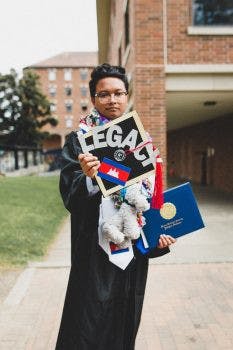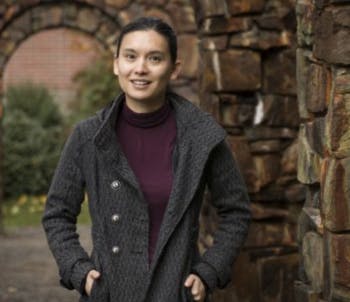Western students set to graduate in the winter and spring will experience their ceremonies virtually due to the COVID-19 pandemic.
According to Paul Cocke, director of communications, 34% of undergraduates who are pending a degree this spring or who received a degree last winter are first-generation students.
Cocke said commencement is a moment to celebrate great accomplishments. This moment can be even more powerful for first-generation students and their families.
What is this powerful significance? When graduation is held virtually, does it take away significance for first-generation students?
Hunter Jupiter, first-generation student and English literature major, said getting to wear her cap and gown and being present at the university she attended for four years was a meaningful part of graduation for her and her family.
Jupiter said a high school senior seminar was her only source of information regarding college and financial aid applications.
“If it weren't for that class, I would have been pretty much on my own in figuring it all out,” Jupiter said.

Jupiter said she faced challenges such as navigating financial aid paperwork and awards, the difference between a major and a minor, and on top of that figuring out what she was interested in pursuing.
“I saw a lot of my peers calling their parents who had been in their position before for guidance and advice, but there really was nothing that my parents could help me with other than a bit financially.” Jupiter said.
Jupiter said her lack of knowledge made her lose confidence and she started doubting that college was a place where she could succeed.
By reaching out to an advisor, Jupiter found that there were resources available to help first-generation students.
“I do feel like graduating is even more meaningful to me now,” Jupiter said. “I also just found out that I am graduating with honors, I am so shocked and just feeling really proud that I made it this far.”
Jupiter said though there is disappointment when it comes to the virtual ceremony, she believes the significance of graduating is ultimately what it means to her and her family.
Cocke said the ceremony will opt for a more personal approach. Instead of reciting every student's name during the ceremony, each student will have their own slide with a photo and information the student submitted.
“We're foregoing long speeches from dignitaries for short video contributions from faculty and families — two groups whose support is vital to all students, particularly first-generation students,” Cocke said. “We hope graduates will see some familiar faces and loved ones on the screen.”
Ricky Rath, a Western alumnus of 2019, said he is extremely proud to be a first-generation student, because the journey wasn't easy.

“I had to go through the whole high school process of applying for colleges, figuring out financial aid, and college primarily by myself because my parents were not very fluent in English,” Rath said. “There's a lot of aspects it takes to be a first-generation student.”
Throughout his five years at Western, Rath said there were many struggles, such as coming into Western with little resources financially and then managing his funds when it came to loans and financial aid.
Rath said he was surprised when he realized that some people didn't experience these same issues at Western.
“These downfalls just made the journey that much more satisfying in the end, especially on graduation day,” Rath said.
Rath said the physical act of the ceremony was important to show gratitude toward his parents, who helped him financially throughout college as well as high school.
“Those couple hours you have to sit there and wait for your name to get called to walk up and grab your diploma, you know, probably meant the world to my parents,” Rath said. “As well as the moment you are walking out of the facility and see my family holding flowers and balloons. Just that moment. I think it's irreplaceable.”
Regina Barber DeGraaff, first-generation graduate from Washington State University and a physics and astronomy senior instructor at Western, said she found that she didn't fit the “norm” for a science or physics major.

“I felt like I should have had older parents. I should have had educated parents. Not only educated parents, I felt like I should have had a dad or a mom who was an engineer or a scientist,” Barber DeGraaff said.”There were so many stereotypes that I wasn't fitting and that bothered me.”
Barber DeGraaff said there were a couple of students that had similar stories like her’s, but they weren't the majority.
Barber DeGraaff said she’s been to all of her graduations for all of her degrees. Through the years she noticed that some classmates didn't feel like graduation was important.
“Anecdotally, I'm thinking about my friends who didn't want to go to graduation and they were kids of engineers, kids of teachers and kids of people whose parents did have education,” Barber DeGraaff said. “It's almost as if they were treating getting a bachelor's degree as like getting a high school degree.
Barber DeGraaff said she was told by her cousins that because she and her sister finished school, they were inspiring them.
“I don't like saying that, it makes me feel gross inside, but I think it showed that being that first kid finishing college meant a lot to my family,” Barber DeGraaff said.
Katherine Anderson, first-generation graduate at Indiana University and assistant professor in the English Department at Western, said as a first-generation student she found it was hard to be divided into two worlds.
“In some ways, my education has put a kind of barrier up between my family and I,” Anderson said. “I don’t ever feel 100% comfortable in the academic world either. I will always be the outsider who doesn’t quite fit in and isn’t really ‘one of us,’ in both places.”
Anderson said her family was still supportive. Her parents, sister and all four grandparents came to watch her ceremony.

“My grandma told me that she had always wanted to go to college, and she saw me as achieving that dream for her. The ceremony meant something to me because of what it meant to them,” Anderson said. “They were all crying during the graduation ceremony.”
Anderson said it’s important for students to remember that they did something amazing, whether they get to walk down the aisle for their diplomas or not.
“I especially hope that first-generation students coming from backgrounds and family histories where education is not an entitlement or an expectation will remember that you worked hard and you earned this," Anderson said. "Having a Zoom replacement ceremony cannot take that away from you.”
Anderson said in some ways, graduates this June have worked harder than other college graduates have in the past.
“Graduating despite the chaos and horror of a global pandemic is a big deal,” she said.
According to Westerns commencement FAQs, when Western is safe to hold large events they’ll offer an option for students to walk the next available quarter.
Cocke said if students attend the virtual commencement and don’t find it as memorable or meaningful as they hoped, they’ll be invited back to an in-person ceremony.
“We do hope that this moment will help students feel closure and accomplishment with their academics at Western,” Cocke said.





